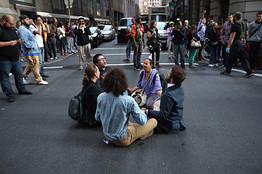‘Entrepreneurial capitalism takes more people out of poverty than aid.” That statement came not from a tea-party leader or a congressional Republican, but from Bono, singer, celebrity, and global anti-poverty activist, speaking to Georgetown’s Global Social Enterprise Initiative last year.
As we mark the second anniversary of Occupy Wall Street this week, it is worth recalling just how much Bono is right and OWS, at its anti-capitalist core, is deeply and profoundly wrong.
AdvertisementOccupy Wall Street did have a point when it took to criticizing the crony capitalism that helped precipitate the economic crisis of 2008 and the recession that followed. But that unholy alliance of Big Business and Big Government, a dog’s breakfast of regulation, guarantees, and bailouts, has nothing in common with free markets and entrepreneurial capitalism.
OWS was and remains hostile to the very idea of capitalism. “Capitalism is tyrannical, exploitative and dehumanizing; it’s intolerable . . . Capitalism IS the problem,” proclaims the main OWS website.
Yet capitalism has done more to empower people and raise living standards than any other force in history.
Throughout most of human history, nearly everyone was poor. Even our wealthiest ancestors enjoyed lower standards of living than ordinary people in America today. It was not until the beginning of the 19th century that the masses started to enjoy real and growing prosperity.
What was the difference? Capitalism and its offspring, the Industrial Revolution. As Charles Murray explains, “everywhere that capitalism subsequently took hold, national wealth began to increase and poverty began to fall. Everywhere that capitalism didn’t take hold, people remained impoverished. Everywhere that capitalism has been rejected since then, poverty has increased.”
The transformation occurred first in the West, which was quickest to embrace capitalism, but is spreading now to the rest of the world. In the last 20 years, for instance, capitalism has lifted more than a billion people worldwide out of poverty, while the share of people in developing countries living on less than $1.25 a day has been cut in half. In China alone, 680 million people have been rescued from poverty, and the extreme-poverty rate has gone from 84 percent in 1980 to less than 10 percent today. In Africa, inflation-adjusted per capita incomes rose by an astonishing 97 percent between 1999 and 2010. Hunger in India shrank by 90 percent after the country replaced 40 years’ worth of socialist stagnation with capitalist reforms in 1991.
One can simply look at the difference between countries that embrace free-market capitalism, to varying degrees, and those with rigid state-controlled economies. Recall the classic comparisons between East and West Germany before the Wall fell, or now, between North and South Korea.
But perhaps more telling than such extreme examples is the fact that countries in the top quartile of the Cato Institute’s annual Economic Freedom of the World Index had an average per capita GDP of $31,501 in 2009, compared with $4,545 for those nations in the bottom quartile. The poorest 10 percent of the population in the most economically free nations had an income more than twice the average income in the least economically free nations.
Milton Friedman points out that “the only cases in which the masses have escaped from . . . grinding poverty . . . in recorded history are where they have had capitalism and largely free trade. If you want to know where the masses are worst off, it’s exactly in the kind of societies that depart from that.”
This shouldn’t surprise anyone outside of OWS or the Obama administration. It is capitalism that unleashes and incentivizes innovation, creativity, and discovery. People become rich by providing goods and services that are desired by others. And those who devise new or better goods and services are likely to become richer faster. A third of the wealthy “1 percent” in America are entrepreneurs or managers of nonfinancial businesses. Nearly 16 percent are doctors or other medical professionals. Lawyers made up slightly more than 8 percent, and engineers, scientists, and computer professionals another 6.6 percent. These capitalists don’t just create wealth; they provide us with the goods and services that make our lives longer, better, and more comfortable.
And capitalism doesn’t just produce wealth, it creates opportunity. In a capitalist system, an individual’s future is not fixed by caste or hereditary social status. Consider that 80 percent of American millionaires are from the first generation of their family to obtain such wealth.
In fact, many of the earliest critics of capitalism disdained it because it allowed merchants and others to rise above what was considered their natural station. Capitalism threatened the old social order. And it still does so today. Race, religion, gender, and sexual orientation are irrelevant, enabling individuals to rise above social attitudes and historical discrimination. To cite just one example, despite America’s deplorable history of slavery and racism, there are at least 35,000 African-American millionaires today.
And finally, it is important to remember that capitalism is based on voluntary interaction and exchange. It is the antithesis of force and violence. Systems based on “spreading the wealth around” inevitably must impose themselves on at least some people. If I dislike Corporation X for some reason, if I think they make lousy products, or are poor corporate citizens, or whatever, I can refuse to deal with them. Try telling that to the IRS.
Certainly this country, like much of the world, has been through a tough few years. But if we want to once again set our feet on the path to growth and prosperity, we would be better off listening to a bit more Bono and a bit less Occupy Wall Street.




 for "a red guitar, three chords and the truth"
for "a red guitar, three chords and the truth"